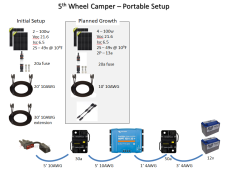MalibuDave42
New Member
- Joined
- Sep 21, 2021
- Messages
- 8
I think I'm on right track, but don't have the confidence yet. I have not bought anything. This system will be added to my 5th wheel camper. Though lots of folks put panels on the roof, I prefer to park in the shade. Therefore, I want to have portable panels. The first build out is 2 -100w panels, but I do want to design for 4 - 100w panels (no need to replace pieces parts). Open to all suggestion, thanks in advance!




